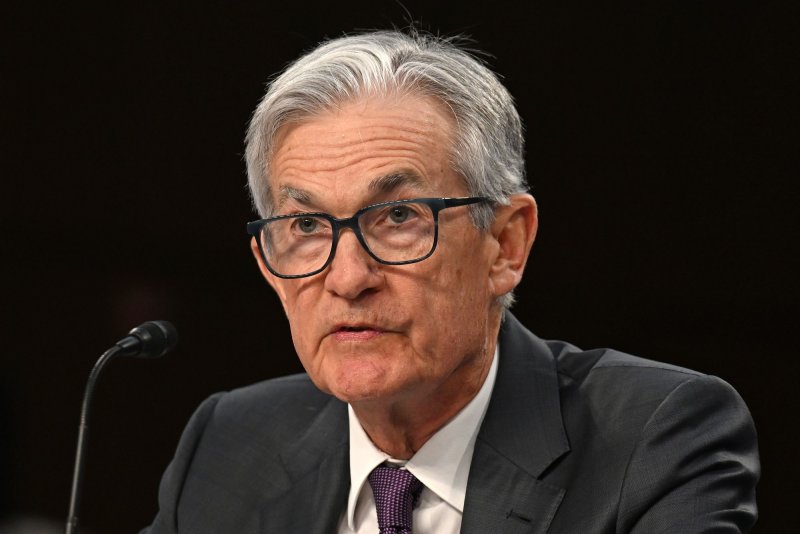1 of 3 | Federal Reserve Chair Jerome Powell testifies at the Senate Banking, Housing and Urban Affairs committee hearing on Capitol Hill in Washington, D.C., on Tuesday. Powell discussed interest rates and the general health of the economy in his semi-annual report. Photo by Annabelle Gordon/UPI |
License PhotoFeb. 11 (UPI) — Federal Reserve Chairman Jerome Powell testified on Capitol Hill Tuesday for the first of two hearings this week.
Powell told the panel that the Federal Reserve is in no hurry to adjust its monetary policy as it continues towards its goal of 2% annual price growth. He is testifying before the Senate Banking Committee for the “Semiannual Monetary Policy Report.” He will meet with the House Financial Services Committee on Wednesday.
“With our policy stance now significantly less restrictive than it had been and the economy remaining strong, we do not need to be in a hurry to adjust our policy stance,” Powell said in his opening statement. “We know that reducing policy restraint too fast or too much could hinder progress on inflation. At the same time, reducing policy restraint too slowly or too little could unduly weaken economic activity and employment.”
The Federal Reserve lowered interest rates by a percentage point last year in a series of incremental cuts.
Powell said the economy is healthy overall, based on the measurements used by economists. However, he addressed the disconnect between a healthy economy and the average American’s perception.
“What people are feeling is the result of several years of inflation, particularly in the lower- to moderate-income category,” Powell said. “We do understand that and we try to keep that in mind even though we acknowledge the overall data are good, we see what people are feeling.”
The economy is still feeling the effects of the COVID-19 pandemic as well, Powell said.
Powell’s testimony yielded little insight into the effects of President Donald Trump‘s proposed tariffs and other policy decisions on the marketplace. He said he would not comment on tariffs or specific policies directly but the central banking system would continue to monitor and respond to economic conditions in a “thoughtful, sensible way.” He expressed confidence that the Federal Reserve will be able to respond to future uncertainty.
He also did not offer any clarity about the state of mortgage rates, which Powell acknowledged remain high. He said there is no way of knowing when they may fall as they are controlled by a number of factors.
Committee chairman Sen. Tim Scott, R-S.C., levied criticism against the Biden administration in his opening statement before turning his ire toward Powell. He said bank regulators were not appropriately held accountable for the Silicon Valley Bank failure in 2023.
“How is it that no bank supervisor has faced any consequences?” Scott said. “How can the people who are supposed to be our cops on the beat not have faced any recourse for such egregious failures? I simply don’t understand.”
The hearings will go over economic developments and prospects for the future as well as monetary policy details, according to the Board of Governors of the Federal Reserve System. Powell last testified before Congress in July.
Sen. Elizabeth Warren, D-Mass., dedicated her opening statement to raising concern about billionaire Elon Musk having access to the sensitive data of American citizens. Warren is the ranking Democratic member of the committee.
“Our financial systems are facing huge risks from the economic chaos of President Trump and his co-president Elon Musk,” Warren said. “Now co-president Musk and his [Office of Management and Budget] director have frozen all work at the Consumer Financial Protection Bureau. There are now zero cops overseeing the $18 trillion consumer lending market.”
Powell confirmed that with the absence of the Consumer Financial Protection Bureau, no federal regulator is overseeing and ensuring that large banking systems are complying with regulations or not breaking the law.
The Federal Reserve has jurisdiction to ensure compliance from smaller state-member banks with less than $10 billion in assets.
The Federal Open Market Committee maintained interest rates in December after cutting rates in three consecutive meetings prior. Interest rates instead remain in the 4.25% to 4.5% range.
Trump was critical of the Federal Reserve for not lowering interest rates but has since said it was “the right thing to do.”
The U.S. economy added 143,000 jobs in January, fewer than what was projected. About 6.8 million people are unemployed. The jobs report will have some influence on the Federal Reserve’s decision to hold, lower or raise interest rates in the future.
The consumer price index for the month of January — another influential measure of the economy’s health — is due to be released on Wednesday.
The two- and 10-year U.S. Treasury yields were up 4.292% and 4.529% respectively on Tuesday ahead of the Senate panel hearing. A Treasury bond yield is the interest rate that the federal government pays to borrow money on a loan that matures in two or 10 years.
